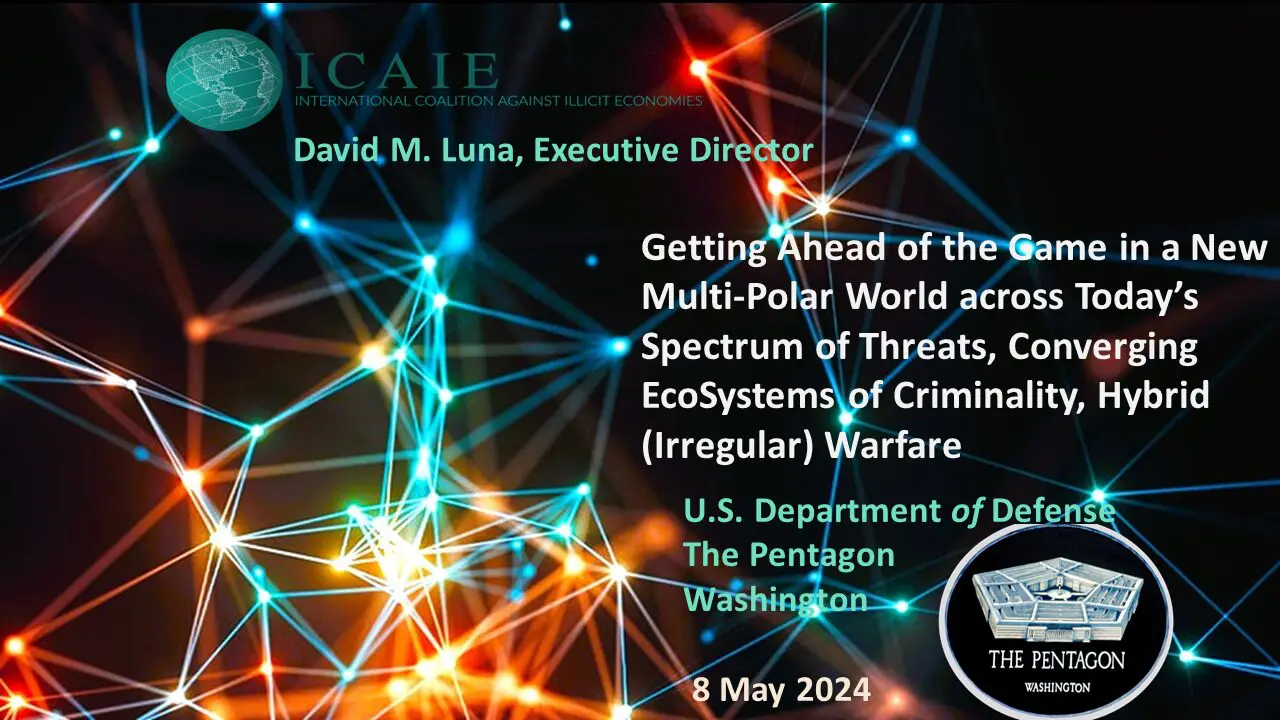ICAIE Keynote Address at The Pentagon: Getting Ahead of the Game in a new Multi-Polar World across Today’s Spectrum of Threats, Converging Ecosystems of Criminality, and Hybrid (Irregular) Warfare
On May 8, 2024 ICAIE Executive Director, David M. Luna gave a keynote address at The Pentagon as part of the POM review and conference of the U.S. Department of Defense (DoD) on countering drug trafficking, illicit threat networks, and threat convergence vectors. The program was chaired by the Deputy Assistant Secretary of Defense for Counternarcotics and Stabilization Policy, in the Office for Special Operations/Low-Intensity Conflict, Under Secretary of Defense for Policy, DoD.
In ICAIE ED Luna’s keynote, he highlighted the cascading effects of today’s spectrum of threats in an ecosystem of criminality and corruption overlayed with hybrid (irregular) warfare in a new multi-polar world;
– through a prism of convergence, I offerred some ideas for leveraging more dynamic threat intelligence and innovation for risk mitigation, disruptions and investigations of illicit threat networks, and dismantling their threat finance operations; and
– consideration for ways to support U.S., international partners, and public-private partnerships strengthen their combined efforts to combat cross-border serious crimes and illicit threat networks.
[D]espite many successes, the global ecosystem of criminality and corruption has expanded greatly today compared to even a decade ago, fueled by criminal opportunists and profit driven-illicit entrepreneurial networks working feverishly to exploit a multitude of new, lucrative criminal economies, including synthetic drugs, contraband pharmaceuticals, and the illegal mining of gold and strategic minerals.
Illicit actors have evolved and diversified across new security landscapes, including by leveraging greater vulnerabilities across the digital world, online marketplaces, dark spaces of the Internet and alliances with deeply criminalized states.
Moreover, active measures and geo-strategic corruption by hostile malign states such as China, Iran, North Korea, Russia, and others, have further financed chaos and insecurity to not only weaken Western democracies, but to fulfill their shared ambition of creating a multipolar world order untethered to the norms of democratic governance and rule of law.
This confluence of organized crime, criminalized states and hybrid warfare has expanded illicit economies globally by orders of magnitude, in ways democratic governments are struggling to understand, map and confront.
Authoritarian regimes, driven less by ideology and more by the desire to stay in power indefinitely, encourage and manipulate politically backed criminal and militia proxies to control prime illicit spaces and conduct criminal activities that corrode governance, political, and market institutions in order to achieve their geopolitical aims, power, and wealth.
These regimes and criminal proxies wreak untold environmental havoc across the world, especially in Latin America and Sub-Saharan Africa, creating damage that will take generations to repair.
Unfortunately, across almost all of today’s illicit industries, we are losing the war against organized crime and illicit threat networks due to outdated intelligence analysis, the lack of understanding of the scale of these challenges; speed, connivance, and use of sophisticated technologies by criminals. The problem is exacerbated because governments are not making these threats a top national security priority, nor are they making the requisite adaptations and investments necessary to effectively counter such transnational threats.
As a result of the magnitude of the mayhem wrought by the scale of expanding illicit economic vectors, burgeoning insecurity, and culture of impunity in criminalized hot spots, the international law enforcement and security communities are under even more pressure, often out-resourced, outmanned, and sometimes, out-gunned. At this point in time, security forces have become largely reactionary instead of proactively working to mitigate the risks and threats posed by organized crime and illicit threat networks.
Without a new baseline understanding of the new global transnational criminal structures, this will not change to meet the challenges.
Moving forward, preventing other crimes and threats here and abroad, before they metastasize into more serious harms, must remain a first-tier national security priority.
Unless we up our game and get ahead with the required political will, resources, and energies needed to push these security boulders up the hill, the battle against many of today’s cross-border crimes will remain a Sisyphean task.

